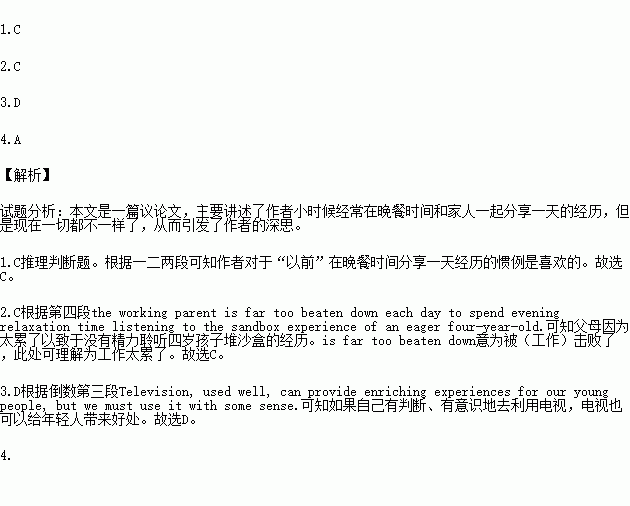题目内容
Back in the old days, when I was a child, we sat around the family roundtable at dinnertime and exchanged our daily experiences. It wasn't very organized, but everyone was recognized and all the news that had to be told was told by each family member.
We listened to each other and the interest was not put-on; it was real. Our family was a unit and we supported each other, and nurtured each other, and liked each other, and—we were even willing to admit—we loved each other.
Today, the family roundtable has moved to the local fast-food restaurant and talk is not easy, much less encouraged.
Grandma, who used to live upstairs, is now. the voice on long distance, and the working parent is far too beaten down each day to spend evening relaxation time listening to the sandbox experience of an eager four-year-old.
So family conversation is as extinct as my old toys and parental questions such as “What have you been doing, Bobby?” have been replaced by “I'm busy, go watch television. ”
And watch TV they do; count them by the millions.
But it's usually not children's television that children watch. Saturday morning, the children's hour, amounts to only about 8 percent of their weekly viewing.
Where are they to be found? Watching adult television, of course, from the Match Game in the morning, to the afternoon at General Hospital, from the muggings and battles on the evening news right through the family hour and past into Starsky and Hutch. That's where you find our kids, over five million of them, at 10 p. m. , not fewer than a million until after midnight! All of this is done with parental permission.
Television, used well, can provide enriching experiences for our young people, but we must use it with some sense. When the carpet is clean, we turn off the vacuum cleaner. When the dishes are clean, the dishwasher turns itself off.
Not so the television, which is on from the sun in the morning to the moon at night and beyond!
Parents must exercise some control and show some concern about the cultural influence on the child when a program not intended for that child is viewed. Parents need to intervene (干涉). Nonintervention may be a wise policy in international affairs, but the results of parental nonintervention will not be wise at all.
1. From the first two paragraphs one may infer that the writer's a attitude towards “the old days” is______.
A. being tired of B. hating
C. preferring D. disappointing
2.The working parent is not willing to listen to her (his) four-year-old child talking about his sandbox games because ______.
A. she (he) is boring B. she (he) is busy
C. she (he) is very tired D. she (he) is angry
3.If we use television with some ______ television can provide our young people with much knowledge.
A. instruction of experts
B. indication of teachers
C. direction of engineers
D. judgment of our own
4. What is the main idea of the last paragraph?
A. Parents must exercise some control and show some concern about the cultural influence on the children.
B. Nonintervention may be a good policy in international affairs.
C. Parental nonintervention will not be praised.
D. Parents need to intervene.
书面表达
目前,学校存在少数学生考试作弊现象。某英文杂志社拟就此现象向中学生征文。标题是“My Opinion on Cheating in Examinations”。请根据下列提示用英语写一篇征文稿。内容要点如下:
主要原因 | 考试偏多,偏难 |
不用功,懒惰 | |
取悦父母、老师 | |
个人看法 | 作弊不对,违反校规 |
要诚实,努力学习 | |
……(其他看法) |
注意: 1.短文必须包括所有内容要求,可适当发挥。
2. 短文标题与开头已为你写好,不计入总字数。
3.字数100左右。
4. 参考词汇:作弊 cheat(v) 勤奋的diligent 惩罚punish
My Opinion on Cheating in Examinations
At present, some students have picked up a bad habit--cheating in examination.
______________________________________________________________________
______________________________________________________________________
______________________________________________________________________
______________________________________________________________________
______________________________________________________________________
______________________________________________________________________

